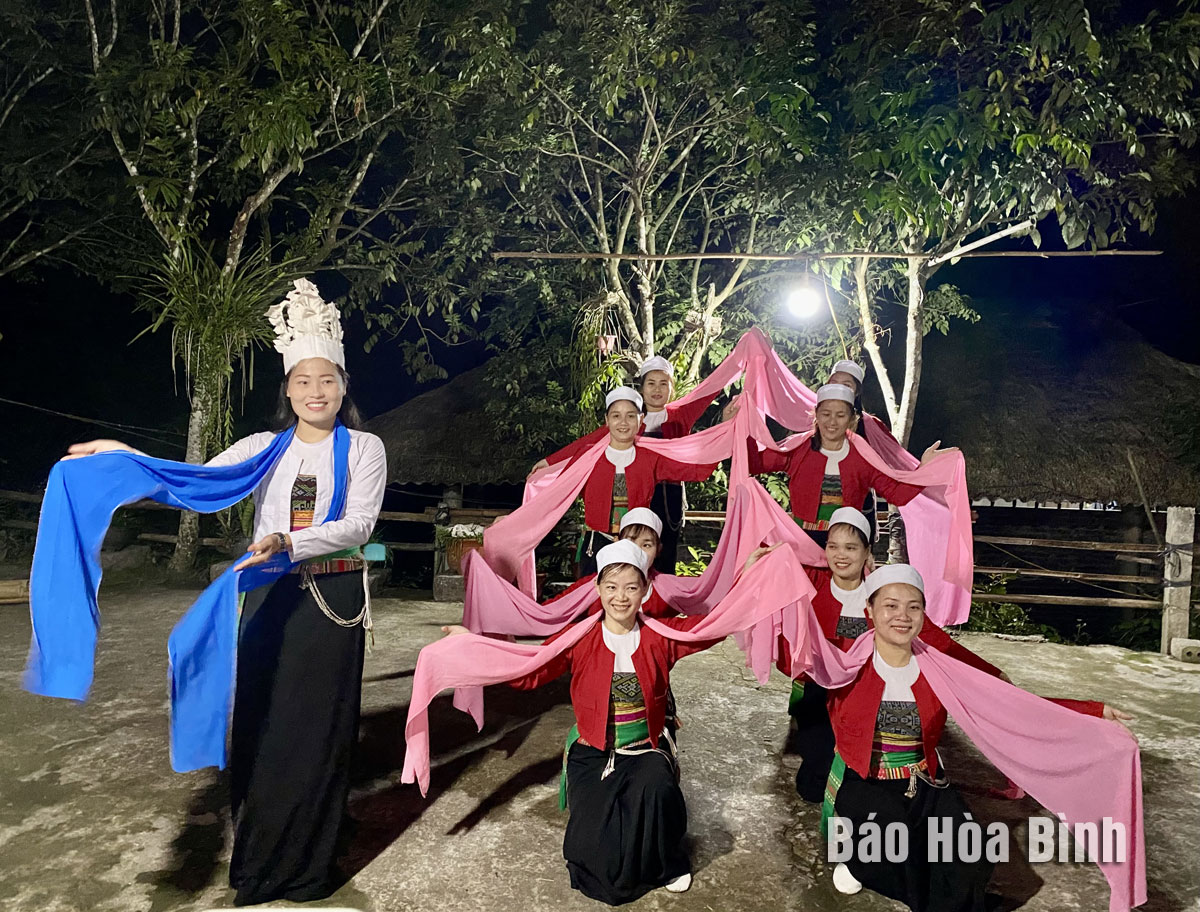
Binh Thanh commune in Cao Phong district of Hoa Binh province has been taking advantage of local cultural identity and diverse natural landscapes to boost its tourism development.
The musical team of Mo hamlet in Binh Thanh commune
performs a traditional dance to serve tourists.
Dinh Van Lan, Vice Chairman of the commune People's Committee, said that
developing tourism associated with cultural preservation, particularly Muong
ethnic culture has been included in the locality’s socio-economic development
plans.
Many activities have been taken to preserve and promote cultural
values in the community.
The commune annually organises festivals and cultural exchanges
at the grassroots level and culture-tourism weeks to introduce and promote
local culture, which helps attract visitors. On major national holidays or
important events, the commune also holds cultural, artistic and sport
activities.
Particularly, the commune organises an art and sport exchange
programme to celebrate the founding anniversary of the Party and spring yearly.
This year, on the 7th day of the Lunar New Year, besides artistic performances,
there will be a volleyball tournament and folk games such as throwing a sacred
ball through the ring (nem con), tug of war and stick pushing.
A musical team in Mo hamlet regularly performs to serve
tourists. In addition, a Muong language-singing club brings together 20 members
who share love for the art of singing Muong songs.
The commune implements communication activities to raise the
awareness of ethnic communities in preserving cultural identity, particularly
their language, costumes, and stilt houses. It also pays attention to directing
the management of the construction of a community-based tourism area in Mo
hamlet.
A total of 36 households in the hamlet are participating in
community tourism. Some businesses are investing in and promoting eco-tourism
such as Lahills Hoa Binh, Moda Group, Beru Group, and Mo hamlet community
tourism cooperative.
To gradually form community cultural tourism products, the
commune directed the restoration and development of traditional occupations and
promoted local products such as Da River fish, chickens, pigs, fruits and
vegetables to supply to restaurants and business households in tourist areas.
Located just a 20-minute drive from Hoa Binh City, Ora Hill Farmstay & Glamping Hoa Binh is a captivating new destination nestled in Mo hamlet, Bình Thanh commune, Cao Phong district. Combining farming with leisure, this tranquil retreat is perfect for those seeking balance, joy, and an immersive experience in the expansive beauty of nature.
Muong Bi - Tan Lac is renowned as one of the four famous Muong regions in Hoa Binh province. Blessed by nature with a favourable climate and stunning landscapes, Tan Lac holds great advantages for tourism development. The local tourism industry has made remarkable strides in recent times thanks to the attention and support from the local authorities and sectors.
With its strategic location, well-developed transport network, and diverse soil and climatic conditions, Hoa Binh is emerging as a must-visit destination in Vietnam's northwestern tourism corridor. The province boasts numerous attractions, including the Kim Boi hot springs (Kim Boi district), the Dau Rong cave complex (Cao Phong), the Mai Chau valley (Mai Chau), and the iconic Hoa Binh hydropower plant.
The northern mountainous province of Hoa Binh has been listed among the 71 most beautiful places to visit worldwide by the prestigious US travel magazine Condé Nast Traveller.
Hoa Binh province’s rich natural and cultural resources position it as a prime location for developing community-based tourism (CBT). In recent years, support from central and provincial policies, as well as assistance from non-governmental organisations, have encouraged local ethnic minority and mountainous communities to actively engage in the sector.



